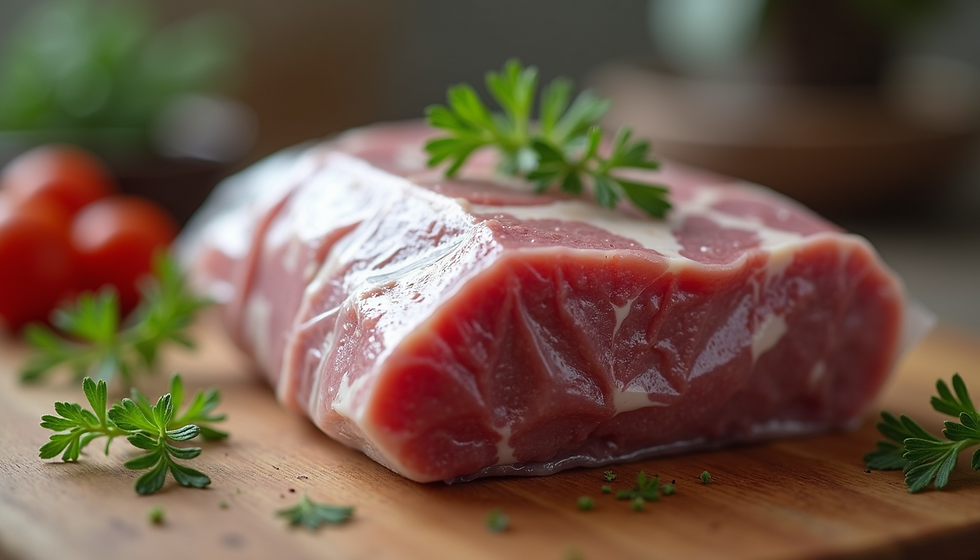The Role of Ethical Practices in Meat Production
- Carnivore Chronicles
- May 30, 2025
- 4 min read
Ethical practices in meat production have become a hot topic in recent years. As consumers grow more conscious of where their food comes from, they are increasingly demanding transparency and responsibility from producers. This blog post will explore what ethical practices entail, their importance, and how they can be implemented effectively in the meat industry.
Understanding Ethical Practices in Meat Production
Ethical practices in meat production refer to approaches that prioritize animal welfare, environmental sustainability, and fair treatment of workers. They encompass a wide range of principles and actions that aim to ensure animals are raised humanely, land and resources are preserved, and workers are respected.
Some key facets of ethical practices include:
Animal Welfare: Ensuring that animals are treated humanely throughout their lives.
Environmental Responsibility: Minimizing the ecological footprint associated with meat production.
Fair Labor Practices: Ensuring that workers are paid fairly and work in safe conditions.
The integration of ethical practices is becoming increasingly vital as consumers demand higher standards for animal care, environmental stewardship, and social responsibility.

The Importance of Ethical Practices
Implementing ethical practices in meat production is critical for various reasons. Consumers are more informed than ever, and their eating habits are shifting toward sustainably sourced products.
Enhancing Consumer Trust
When meat producers adopt ethical practices, they build trust with consumers. Shoppers feel more comfortable purchasing meat when they know that animals were raised in humane conditions and that the environmental impact was taken into account.
According to a study by the American Society for the Prevention of Cruelty to Animals (ASPCA), 74% of consumers are willing to pay more for humanely raised meat. This presents meat producers with an opportunity to cater to this growing preference and solidify their market position.
Reducing Environmental Impact
The meat industry has long been criticized for its significant contribution to environmental degradation. From greenhouse gas emissions to deforestation, the concerns are vast.
Ethical practices can help mitigate this impact significantly. For instance, incorporating practices such as rotational grazing can help restore soil health and capture carbon, contributing to a healthier ecosystem.
A study conducted by the University of California Davis found that pasture-based systems could reduce greenhouse gas emissions by up to 50% compared to conventional methods.

Promoting Animal Welfare
Animal welfare is at the forefront of many ethical practices. Raising livestock in humane conditions not only benefits the animals but also contributes to better quality meat. Stress in animals can lead to poor health and a lower quality end product.
Practices such as providing ample space, natural light, and proper nutrition can improve animal wellbeing, which translates into better meat for consumers. By adopting these practices, producers ensure a more ethical approach to meat production that meets modern standards.
Challenges in Implementing Ethical Practices
While the benefits of ethical practices are clear, numerous challenges exist in their implementation.
Cost Factors
Transitioning to ethically sound methods often requires significant initial investment. From infrastructure upgrades to acquiring certifications for humane treatment, the costs can be daunting for many producers, especially smaller farms.
However, it is crucial to communicate the long-term benefits of these investments to ensure that farmers can see the returns. Sustainable practices can lead to reduced costs in the long run through improved efficiency and productivity.
Consumer Education
Even though consumers are increasingly interested in ethical practices, many still lack comprehensive knowledge about the various standards and their impacts.
Producers can play a pivotal role in educating their customers about the benefits of ethical meat production. This can be achieved through transparent labeling, factory tours, and engagement on social media platforms.
How to Adopt Ethical Practices
To support the growing demand for ethically produced meat, producers can start implementing some straightforward strategies.
Evaluate Current Practices
Producers should begin by auditing their current production methods. Identify which areas align with ethical practices and which need improvement. Consider aspects such as animal welfare, worker treatment, and environmental impacts.
Partner with Ethical Organizations
Collaborating with organizations that focus on animal welfare or environmental sustainability can provide valuable insight and resources for implementation. These partnerships can enhance credibility and serve as platforms for educational initiatives.
Invest in Education and Training
Providing training on ethical practices for employees is vital. Make sure all workers understand the importance of humane treatment and sustainable farming practices. This training can significantly impact how ethics are embedded into the daily operations of meat production.
Engage Customers
Engaging consumers through educational content and transparent communication is essential. Use packaging labels, social media campaigns, and direct customer engagement to inform buyers about the ethical measures being practiced in your operations.

The Future of Ethical Meat Production
The future of meat production hinges on the successful integration of ethical practices. As the layer of consumer awareness deepens, producers must adapt to stay relevant.
The trends indicate a growing market for sustainably sourced and ethically produced meat. Brands that prioritize transparency, responsibility, and welfare will likely thrive in this changing landscape.
Final Thoughts
As we progress into a more environmentally conscious era, the role of ethical practices in meat production cannot be overstated. By ensuring animal welfare, promoting sustainability, and upholding fair labor practices, producers can make a significant impact. The road to ethical meat production is filled with challenges, but it is essential for a healthier planet and future generations.
Being a responsible consumer also plays a crucial role in this journey. Supporting brands that align with ethical practices encourages more producers to adopt these necessary changes, creating a ripple effect. Together, we can pave the way for more humane and sustainable meat production practices.




Comments